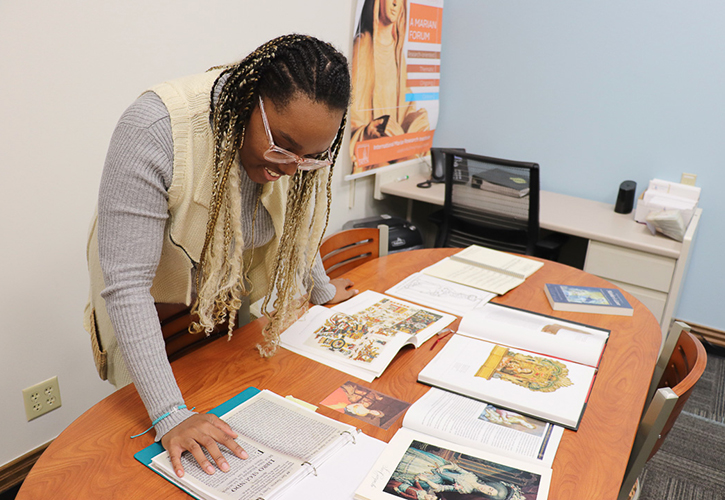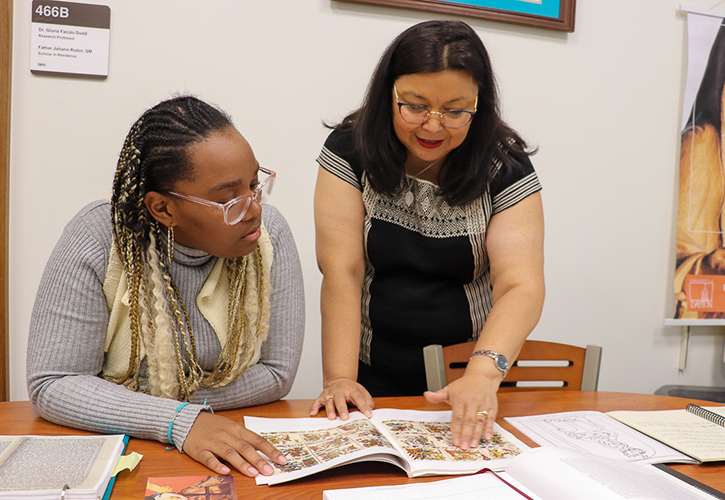College of Arts and Sciences Newsroom

Biology student’s research project examines toxins, breast milk and Nursing Madonnas
By Kassidy Lammers ’24
Many items people encounter in everyday life contribute to the consumption of environmental toxins, which can be transferred across generations through breast milk. That is a key finding of University of Dayton senior Rihanna Domingos’ research project that explores the long term impact of harmful chemicals.
Domingos, a biology major from Louisville, Kentucky, is collaborating on the project with Neomi De Anda, associate professor of religious studies and executive director of the International Marian Research Institute. Domingos will present her research April 17 at the Br. Joseph W. Stander Symposium.
The project began in June 2023 through the College of Arts and Sciences Dean’s Summer Fellowship program, which provides opportunities for students to work with a faculty mentor on an original research project.
Domingos examined the presence of toxins in countries in Asia, Europe and South America, and plans to expand her research to include specific regions in North America.
“I got to look into polychlorinated biphenyls, which are one of the main environmental toxins that are found in our daily lives today,” Domingos said. “They have been banned since the 1970s because their impacts were so significant.”
Polychlorinated biphenyls were used in industrial products such as electrical equipment, hydraulic fluids and heat transfer fluids. Despite having been outlawed in the Toxic Substances Control Act of 1979, side effects of their use continue to be linked to children and young adults today.
“When we eat certain foods or use certain products that have been exposed to these toxins, it becomes present in our bodies, and studies have shown that they don’t just go away,” Domingos said.
In addition, Domingos said people may ingest harmful toxins as infants and toddlers through breast milk from a mother who was previously exposed, allowing these chemicals to be passed from generation to generation.
The presence of environmental toxins in infants has been linked to low birth weight, altered hormone levels and diseases such as cancer, Domingos said. She also found increased instances of women having miscarriages and lacking a sufficient breast milk supply after child birth, which is directly tied to their exposure to environmental toxins throughout their lifetimes.
“It’s crazy to think about how something can have such a domino effect,” she said. “Breast milk is so essential to humanity — everyone brought into this world needs to be fed. And for most, this is done through breastfeeding. So to look at things like this and see how it has impacted breastfeeding rates is so interesting.”

Domingos’ research extends beyond biology. Along with examining the impacts of specific toxins in breast milk, she worked with De Anda to draw connections between breastfeeding practices and images of Nursing Madonnas, which have been part of the Christian tradition for centuries.
“In the Catholic Church, there is this notion of ‘traditioning’ — that we continue to build traditions as sources for theological thought,” De Anda said. “Rihanna’s research shows us the importance of thinking about ‘traditioning’ as something that is not just pure, spiritual and always positive. Even things that many times carry a positive message, like nursing, often carry a much more complex message.”
De Anda’s research focuses on an ecotheology project about understanding images of Nursing Madonnas as well as the environmental impacts on breastfeeding infants. Domingos’ research provides a scientific basis for the theological framework, De Anda said.
“Our discussions have been so much fun,” De Anda said. “I’ve learned so much from her and her research — she has helped me understand some of the scientific pieces further. I have expertise in a certain area, but not every single area, so to have someone else work with me on research and be dedicated to it is amazing.”
Domingos’ research also provides a framework for her future career in microbiology. She said her experience working with De Anda not only helped her develop research-specific skills, but also a desire to use her knowledge to make a difference in the world.
“It’s easy to just fall into that ‘I don’t care’ mentality with these big issues, because it seems like there’s nothing we can do,” Domingos said. “If we, at our age, live in ignorance, then the next generation will live in ignorance. But if we have the conversations, get to the root of the issues and talk about how we can change the narrative, we really can make the change.”
For more information, visit the Department of Biology and Department of Religious Studies websites.
